Paiements numériques
Les technologies numériques transforment la manière dont nous répondons aux urgences. Les innovations sont multiples : elles concernent l’identification des personnes ayant droit à une aide, la collecte des données pour les évaluations et le suivi ou encore la communication aux communautés affectées par la crise. Les systèmes de paiement numérique, dont les appareils mobiles, les coupons électroniques et les cartes, lorsqu’ils sont utilisés de manière appropriée, peuvent accélérer, sécuriser et optimiser l’assistance, la rendant également plus inclusive. Toutefois, le volume de données personnelles que nous collectons, stockons et partageons augmentant, nous devons nous assurer que nos systèmes de protection des données restent pertinents et veiller à comprendre et atténuer les risques associés aux nouvelles technologies.
Contenu associé

Podcast: Is informed consent possible in humanitarian CVA?
Podcast
Episode 2 of the CashCast tackles data responsibility with Amos Doornbos, Linda Raftree, James Eaton Lee and Ric Tighe

Consent and Ownership in the Shift to Digital Cash and Voucher Assistance
Blog Post
Part of committing to cash and voucher assistance (CVA) is committing to going digital and collecting data. While they are two different things, they are deeply intertwined. And while an organisation can ‘go digital’ without cash programmes, it’s nearly impossible to commit to cash programmes in the long term without going digital. Yes, it is true we’ve done cash and voucher programmes...
Contenu récent

Cash in Emergencies Toolkit
Guidelines and Tools
Access Toolkit Here Cash transfer based programming (CTP) is an effective and flexible way to support people affected by emergencies, maintaining their dignity and choice, while fostering local economies. CTP includes all forms of cash and voucher-based assistance. The Cash in Emergencies Toolkit has been...

Guide de mise en œuvre d’e-transfert
Guides et outils
Le Guide de mise en œuvre d’e-transfert a été créé pour les membres de l’équipe de Mercy Corps qui envisagent d’utiliser – ou qui utilisent déjà – les e-transferts pour apporter l’aide aux participants au programme. Les chapitres 1 et 2 donnent un aperçu des étapes nécessaires à...

Challenges and the State of Play of Interoperability in Cash Transfer Programming
Guidelines and Tools
This study explores the factors driving the design of interoperability for Cash Transfer Programming. It outlines the rapidly changing environment in which digital services are emerging, the types of digital collaborations that could be enabled, and the key design challenges that confront effective...
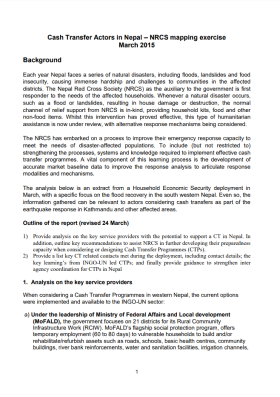
Cash Transfer Actors in Nepal – NRCS Mapping Exercise
Report
Each year Nepal faces a series of natural disasters, including floods, landslides and food insecurity, causing immense hardship and challenges to communities in the affected districts. The Nepal Red Cross Society (NRCS) as the auxiliary to the government is first responder to the needs of the affected...
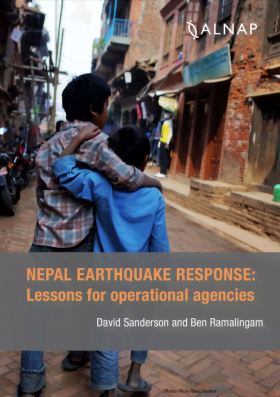
Nepal Earthquake Response: Lessons for operational agencies
Policy paper
In the aftermath of the April 2015 earthquake in Nepal, this paper looks at lessons drawn from previous comparable disasters and seeks to provide invaluable information and assistance to the operational agencies responding to the crisis. Seventeen Lessons give an overview of important learnings based on...

2015 State of the Industry Report. Mobile Money
Report
Mobile money is reaching more than 411 million people globally. Moreover, it is available in 85% of countries where the vast majority of the population lacks access to a formal financial institution. This is an extraordinary achievement, demonstrating the power of mobile, underpinned by the critical...

Seeking Solutions: New roles for technology in cash and voucher programs – An inspiration brief for technology and private sector partners
Policy paper
Today, more people have been forced to flee their homes than at the height of World War II. The scale of these humanitarian crises are challenging, and sometimes outpacing, the capacity of institutions created to respond to them. Yet, the approaches we have available to reach populations in need have also...
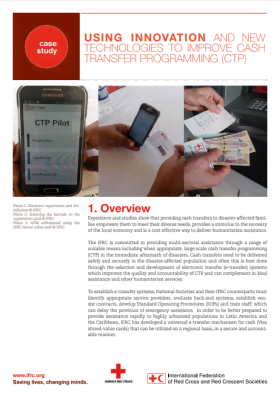
Using Innovation And New Technologies to Improve Cash Transfer Programming (CTP)
Report
Experience and studies show that providing cash transfers to disaster-affected families empowers them to meet their diverse needs, provides a stimulus to the recovery of the local economy and is a cost effective way to deliver humanitarian assistance. The IFRC is committed to providing multi-sectoral...

Financial Services Primer for Humanitarians
Guidelines and Tools
Financial services facilitate a wide range of economic and households activities in any society. They enable trade and business expansion and allow individuals to save, send and borrow money. Humanitarian cash transfers, particularly when delivered electronically,can expand access to financial services...
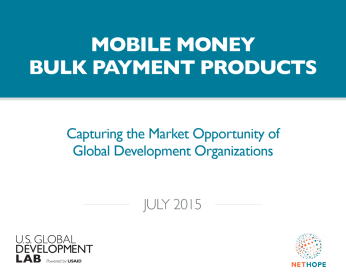
Mobile Money Bulk Payment Products: Capturing the market opportunity of global development organizations
Presentation
International relief and development organizations (DOs) receive significant aid funding from donors, which they regularly disburse in high volume, low value payments to millions of recipients for program and operational expenses. DOs and donors are increasingly using and promoting the use of new digital...
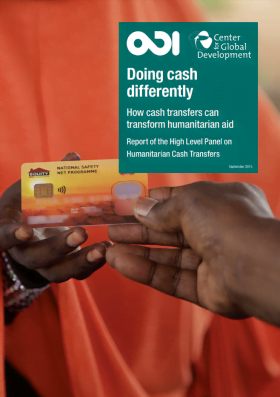
Doing Cash Differently: How cash transfers can transform humanitarian aid?
Policy paper
This report commissioned by the Overseas Development Institute highlights why giving aid directly in the form of cash is often a highly effective way to reduce suffering and to make limited humanitarian aid budgets go further. The publication, ,written by the High Level Panel on Humanitarian...

Cash Transfers: Progress made but challenges remain
Blog Post
In five years cash programming has come from almost nowhere to being – for some donors at least – the preferred option, especially in the field of food and nutrition. “We no long measure food aid contributions in wheat/tons equivalent,” says Julia Stewart-David of the EU aid body, ECHO. “That...

USAID Procurement Executive’s Bulletin 2014-06
Policy paper
This Bulletin applies to USAID’s Acquisition Workforce consisting of Contracting Officers (COs), Agreement Officers (AOs), Negotiators, CO/AO Representatives (CORs/AORs), and Activity Managers worldwide. The purpose of this bulletin is to provide guidance to the Acquisition Workforce on promoting...

Unconditional Cash Assistance via E-Transfer: Implementation lessons learned – Winterization support via CSC bank ATM card
Report
This document looks at the lessons learned from the Danish Refugee Council’s e-transfer programme designed to provide cash assistance to Syrian refugees in Lebanon using the CALP Network’s guidelines on e-transfers in emergencies as a point of reference for assessing adherence to best practices.

Payment Mechanisms and Anti-Poverty Programs: Evidence from a Mobile Money Cash Transfer Experiment in Niger
Report
Cash transfers have become an increasingly important component of social protection policies in both developed and developing countries. While such programs are often implemented electronically in developed countries, in many developing countries with weak financial infrastructure, such transfers are...
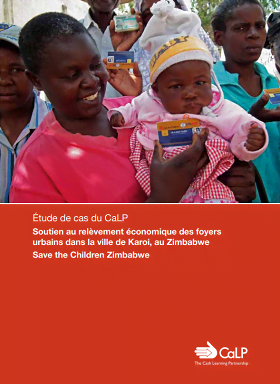
Étude de cas du CALP Network – Soutien au relèvement économique des foyers urbains dans la ville de Karoi, au Zimbabwe
Rapport
Dans la zone urbaine de Karoi, au Zimbabwe, Save the Children a allié des programmes d’argent contre travail au soutien des moyens de subsistance pour répondre aux besoins alimentaires immédiats et soutenir le relèvement économique des familles en situation de pauvreté. Le projet a utilisé des...
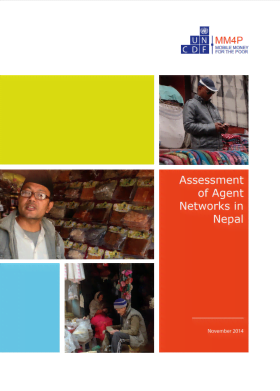
Assessment of Agent Networks in Nepal
Report
This report focuses on assessing the existing agent networks in Nepal, so that the correct steps can be taken to popularise both access to and use of financial services through bank-led agent banking. After the release of electronic banking regulations in 2012, many financial institutions began...
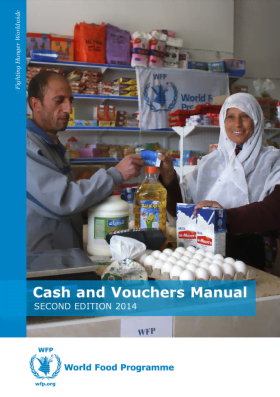
Cash and Vouchers Manual – Second edition
Guidelines and Tools
This second edition of the Cash and Vouchers Manual captures the latest corporately endorsed business processes and procedures, providing the most up-to-date tools (i.e. analytical, assessment, monitoring) that have been developed through close intra-departmental collaboration between Headquarters...

Facteurs affectant l’optimisation des coûts des transferts électroniques dans les programmes humanitaires
Rapport
Ce travail de recherche propose une méthodologie pour évaluer les coûts et présente des études de cas détaillées sur les coûts liés à l’exécution des récents programmes faisant appel aux transferts monétaires en situation d’urgence menés au Kenya et en Somalie, s’inspirant des...
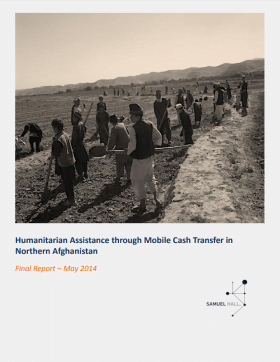
Humanitarian Assistance through Mobile Cash Transfer in Northern Afghanistan: An evaluation of a DFID pilot project in Faryab, Jawzjan, and Samangan
Report
In response to the 2011 severe drought that pushed vulnerable rural households into food insecurity in 14 provinces of Northern Afghanistan, DFID has committed to address emergency needs in northern Afghanistan with nutrition, food security and farming inputs. Samuel Hall Consulting, a Kabul-based...